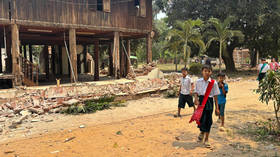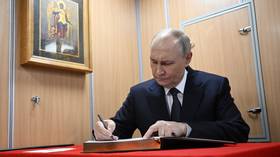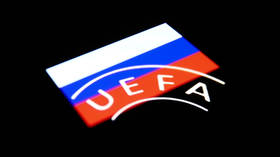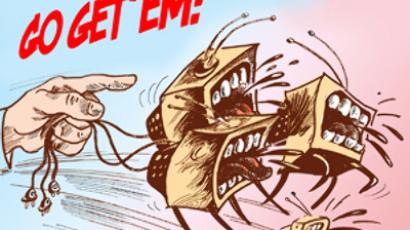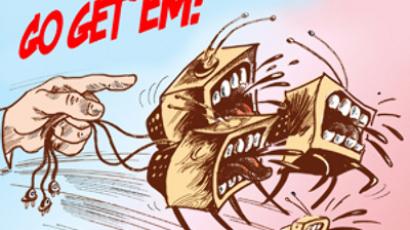WWII-related spin casts shadows on our V-Day
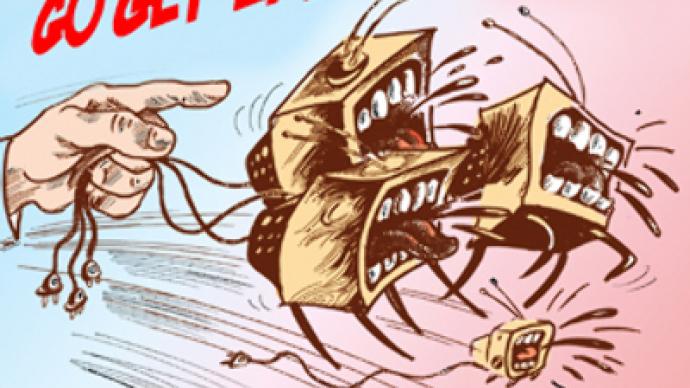
How do you spin a war, 64 years in the past? Piece of cake. You just concentrate on a few conspiracy theories to make the story (or history) interesting, and add something that serves as a delivery vehicle for your spin.
For instance: Hitler hadn’t committed suicide in Berlin but went to live happily ever after in Argentina – or Brazil… with unanimous consent from the KGB and the CIA. How’s that? Just for starters.
For the main course – a choice of at least two delicacies:
Karl Haushofer had planned a great alliance of Germany, Russia and Japan against the Anglo-Saxon domination in the world but his untrustworthy disciple Adolf Hitler decided on a whim to attack Russia and caused the alliance of the Soviet Union, Great Britain and the United States to be born. The defeat of Germany and Japan follows.
Freemasons Churchill and Roosevelt, in continuation of a long-term Masonic plot aimed at the creation of a world government, joined hands with Stalin (another possible Freemason?) in unleashing the second World War and bringing the United States of America into it, with the result of creating a world dominated by only two centers of power – Moscow and Washington. From that time on (for the whole duration of the Cold War) these two centers competed for the role of a world government. Neither won. That is why another cycle of violence is necessary ‘to put things right once and for all times.’
And for the dessert I would offer an outstandingly great idea I have recently stumbled upon on the Internet: WWII was unleashed by the world business community with the sole purpose of establishing petroleum products as fuel for combustion and turbo-jet engines! The author of the idea notes that before 1939 a significant share of the world’s automobiles ran on alcohol while diesel engines ran on vegetable oil…
Nothing in the world is done without purpose.
‘If they light up the stars – someone must need that’ wrote Futurist poet Vladimir Mayakovskiy in the very beginning of the XX Century.
So: why do you spin a war, 64 years in the past? To what purpose? Well… That is a totally different question altogether. I believe some people do it for fun. Others do it to prove that their today’s vision of yesterday is clearer than the memory-vision of those who have seen the real thing. They may have a point. Another Russian poet, Sergey Esenin, once wrote: ‘When face to face – the face cannot be seen; All bigger things are clearer from a distance.’
The distance is six and a half decades and we are looking back at the Great War together: those who remain from the generation that fought in it, those who belong to the generation of their children and their children’s children. And those who came into this world 15 – 25 years ago – a very different new generation, the first one that indeed sees WWII from a distance, the first one that has no daily access to the oral histories of the war.
The first generation which, for its knowledge about WWII, relies exclusively on films and the published word. That generation is the target of WWII-related spin.
I was born in 1963. The Great War entered my world as soon as I became capable of telling a friend from a foe. We played out WWII battles in kindergarten: we already knew about the Battle of Moscow and about Stalingrad and Kursk. I was six when I asked my father why Stalingrad is now called Volgograd. He told me that it had been immodest of Stalin to name a city after himself and that the government decided to change the name after his death.
For us, the kids who went to primary school in 1970 the war was yesterday. It was alive in our minds and hearts, big and small episodes re-told many times in the voices of our grandparents and parents. The grandparents told of battles and life in the trenches, of night-time bombing raids (I heard about them from two perspectives – from the ground, meaning the German raids, and from the cockpit of a bomber, meaning our raids on German positions).
Most of the parents had been kids themselves during the war, and they remembered a lot – including the stuff their parents were reluctant to talk about to their grandchildren: the stench of unburied bodies and the blood and terror of bombed train carriages on the railroads, those very carriages that were supposed to evacuate them to the safety of the Urals and Siberia. Wartime shortages and famine had left a deadly impact on them: many of that generation died in the 1980s, prematurely, of various diseases caused by childhood malnutrition, and we all knew that the war was to blame.
When I was 14–15 years of age we were visiting a ‘widows’ village’ in the Novgorod region, in the very middle of nowhere, 200 kilometers from the nearest police station and hospital. No men had returned to that village from the war. In winter we sang songs and read poetry to the ageing women; in summer we helped with the crops and animals. It just happened that way: all the men of that village had died in combat and their widows were carrying on, working the land. There were many such villages then – by now they have all died out.
From one of my two grandfathers (the other one spent the war building and flying Ilyushin bombers) I learned about the Lend-Lease deal. Grandfather had studied in Russia and then completed his engineering education in the U.S. in the early 1930s. An English speaker and engineer who knew his hardware well, he spent some time with the Lend-Lease program in its initial stages. He spoke of thousands of American-made trucks which came in handy for the artillery, for front-line field hospitals and army supply units, of the fighter aircraft that Russian pilots valued lower than the latest Soviet models (of which there was a severe shortage in the first two years of the war) but were eager to get them fast, train in them and then down as many of the Messerschmitt fighters as they could. He spoke of American canned food that became an integral part of every wartime soldier’s ration.
Grandfather told me of that feeling of common purpose he shared with his American colleagues in those days. The Omaha Beach and the Second Front were nearly three years in the future but it was all beginning right there, in the workrooms of Russian and American officials jointly making Lend-Lease work.
My childhood and youth fell on the Cold War. America then was The Probable Enemy, The main Adversary. But somehow the WWII concept of America the friend and ally lived in our minds and in our hearts even then – alongside the antagonistic rhetoric on both sides, alongside proxy wars and competition over every grain of sand in the superpower sandbox.
We still listened to the wartime American songs translated into Russian, sung by the best of the Russian talent (I still have a wartime recording of Coming in on a Wing and a Prayer). Maybe it happened because we never actually fought each other in that Cold War, apart from chance encounters in the proxy wars around the globe – while in that very hot war of 1941–1945 (for both the U.S. and Russia WWII started in 1941 not 1939) we had fought together against a live common enemy, and a very nasty one at that.
For the kids of the latest computerized generation alternative history is one of the most attractive games. Nothing can prevent them from reversing the Stalingrad battle or having the Japanese drop nukes on America. Everything imaginable and ‘generable’ on a computer screen may happen in that virtual world which has been swallowing our young by the thousand in the past decade.
Conspiracies and spin fit into the game perfectly well. Today over a third of American teenagers believe that Russia fought in WWII on the side of Germany, and many more are uncertain about that. Not more than a third of them know for sure that the Soviet Union and the U.S. were allies, and among those there are children and young adults who are sure that America won the war in Europe and liberated everyone there including the Russians.
So, is that the purpose of the spin? To ridicule and minimize Russia’s role in the Great War? To make the Great War convenient for the understanding of the newer generations in the West, accustomed to Cold War propaganda and genetically suspicious of everything Russian? If that is the purpose, the spin is partly successful. Partly, because there are still 140 million of us Russians, and there are also a billion Chinese, there are Indians and South-east Asians, and there are South Americans and Africans, all having access to both Russian and Western views on the Great War and eligible to make their own choices and conclusions about world history.
For us, those who grew up in Russia and who are now 35, 45, 55 and older, there is no alternative history outside fantasy books and computer games. Whatever games we play, the spin, even the latest spin, doesn’t penetrate our skins, hardened by the touch of the Great War, transferred to us through the genes and the skin of our fathers and grandfathers.
Sometimes, especially two or three generations after an event, an oral history can be much more accurate than many written accounts. It is so with the Great War of 1941–1945. Its written history often falls victim to the spur-of-the-moment influence of day-to-day politics. Much too often to my taste. Descriptions of the events remain but they are cold and lifeless. They cannot give the kids the hands-on feeling that we had and many still have today. That feeling alone, if spread wide enough, is capable of preventing all future wars from happening.
Maybe we should write down the oral histories we all remember from our childhood, ask our grandparents for more information (if they are alive, and if they live close enough to our own dwelling), compare our notes and find a way to load it all onto the Internet in Russian and English, link it up with Google and Wikipedia and then wait and see what happens.
Or we should invite our children, together with their children and their friends, to come and have tea with us, and tell them all a couple of war stories.
Evgeny Belenkiy, RT.





